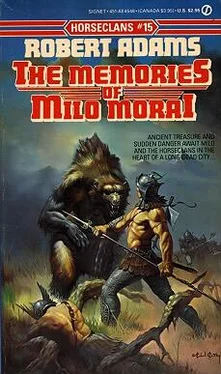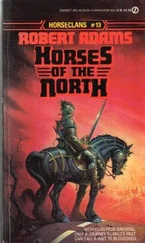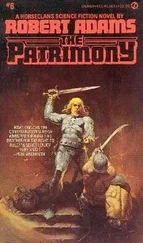When at last they all departed, in vehicles now altered to provide somewhat less comfort but much more protection, they were become far more formidable a force than anything just then moving through the all but deserted landscape of the once-populous State of California. Such few individuals and small groups as they saw along Route 40 took but a single look at the bristling rifles and automatics and afforded the column a wide—a very wide—berth.
At one point, where three semis parked athwart the road served as a roadblock, a single rocket blasting the centermost trailer apart served as a more than sufficient reason for the scruffy types manning the point to recall urgent business . . . elsewhere. After the last of Crippen’s vehicles had cleared the obstruction, Milo drove the three tractors into roadside ditches and set them all afire. The three-wheeled trail bike that he found there he put to immediate and personal use.
They smelled Barstow long before they got within sight of the place. There were corpses everywhere anyone looked, and the shots they fired off in the hopes of bringing anyone still living out onto the streets only served to send overfed buzzards scurrying and flapping about over their grisly interrupted repasts. There were flies everywhere, thick, metallic-sheened swarms of them, and the rotting, rat-gnawed bodies still on the perimeter defenses housed clumps of fat, writhing, wriggling maggots, shiny white or yellow.
The Crippen column wasted no more time, only seeking out enough gas to top off their tanks, retrieving a few weapons and some ammunition, then heading west on Route 58 toward Bakersfield and points north.
Milo determined that Edwards Air Force Base must still be at least partially manned. He never saw anyone or got any answer to his shouts, but he was fired on from at least three points of the fortified main gate. Crippen readily agreed to bypass Edwards.
Bakersfield, when they got there, was Barstow on a far larger scale, sans a perimeter worthy of the name, but including signs of fires, combats and large-scale lootings. It, like Barstow, stank too badly to contemplate staying any longer than absolutely necessary, so they fueled and left the town and its current occupants to Nature’s undertakers.
That night, in their well-guarded camp at what had been a restarea, Milo announced his intention to Crippen. “You’ll make it now, general, if anybody can and if you pay attention to Sergeant Weeks. I’ll be leaving you in the morning, west, into the mountains, taking only what I originally had, plus that trail bike, some spare gas and water and two or three days’ worth of food.”
Crippen snorted. “You’re loco, Moray, you know that? Just how long do you think you’ll last alone? Who’ll care for you if you get hurt or sick?
“Besides, a man like you would be invaluable up in Sacramento now. I’ll probably make a lousy, piss-poor general officer, but you, now, you’d make a fine one.”
“No, thank you, Crippen,” replied Milo. “I’ve been a general, and it’s not all it’s cracked up to be, you’ll find, just much more work and a crushing load of responsibilities and . . .”
Just then, Master Sergeant Weeks dropped his coffee cup and, wide-eyed, exclaimed,“Now I recollect you, sir! Gen’rul, thishere is nobody else but the man the ARVNs calledle saint diabolique. Back when he was a very unofficial U.S. Army observer with the French, he escaped someway from Dien Bien Phu, th’ough the whole fucking Vietminh army and ever’thin’. He come back as a U.S. army adviser and then stayed there for over ten years, off and on, a whole helluva lot of it up in them damn mountains with the Montagnards, and they purely worshiped him, too, they claimed he was a god come down to earth in the shape of a man, that he could grow back any part he lost like a fence lizard grows back a tail and that couldn’ nuthin kill him. I know, gen’rul! I never did see him ’cept at a distance, but I talked to ’Nards and ARVNs as had done knowed him.”
Turning to Milo, the sergeant demanded with respect, “Why don’t you look your age, sir? You’re a whole lot older’n I am.”
Milo had not fielded such a question in a long time, but he still remembered how. “I have always prided myself in keeping fit, sergeant. And did you ever hear of plastic surgery?”
They talked on into the dark night, but Crippen, knowing within himself that he would not be able to change Milo’s mind, made weaker and increasingly weaker attempts to dissuade his savior’s departure, then ceased entirely. The last couple of hours before all retired for what was left of the night were filled with Milo’s reminiscences and anecdotes from his years as a mercenary officer in Africa, the Middle East and various parts of Central and South America.
When the Crippen column headed north, Milo revisited the Bakersfield area long enough to loot a couple of good bows, arrows and accessories and some odds and ends of general camping equipment, then made his way up into the mountains again, seeking to breathe air clean of the cloying stench of decomposing humanity.
Something over a month later, he came down, found a jeeplike vehicle and drove directly to the Noonan place with its generator and powerful short-wave radio. After cleaning the main refrigerator-freezer, he stalked and shot a fat, sizable doe, gathered wild fruits and vegetables from the woods and settled down for a while with the radio.
But it was days before he raised an answering set. Sacramento was unresponsive, by day or by night, and he tried both, at different times each day. It was at night, nearly midnight, that he at last got an answer, such as it was.
“Where are you located, unidentified station? Are you private, governmental or commercial, or are you military?”
“You want to know one hell of a lot without divulging anything yourself,” Milo replied bluntly. “But in answer, I’m a private station a bit northeast of what used to be San Diego, California. Now, who are you and where are you?”
“I am . . . we are, rather, we were a scientific research facility, located in . . . Florida, and that’s all you need to know. Have you been able to raise Washington, D.C.?”
Milo answered. “I haven’t tried ... at least, not recently. It was nuked, you know, one of the first urban areas hit, and hit by more than just one missile, I’ve been told. If you’re some kind of hush-hush government outfit, how come you didn’t know that?”
“What we are or were and our sponsorship and funding is none of your concern,” was the somewhat haughty reply. “Who, exactly, are you? How many of you are there?”
“There’s just me, buster. I’m a retired Army officer, speaking to you from the home of the late General Jerry Noonan. Now tell me a bit more about you. What part of Florida are you in? Did as many die off there as did here?” asked Milo, not really expecting a straight answer from the fanatically security-conscious type on the other radio.
“The Cent . . . ahh, we are in north-central Florida,” said the disembodied voice, somewhat hesitantly. “How many died out there?”
“What I’ve seen of California is wall-to-wall corpses, old and young, male and female, of every race and color,” Milo stated baldly. “I’d guesstimate that at least, at least ninety percent of the former population of this state is dead of disease, starvation, violence or just plain fear. What percentage died back east, there?”
After a longish pause, the voice said stiffly, “That is classified information.”
Exasperatedly, Milo snapped, “Buster, you take your fucking stupid, now-needless and silly security shit and shove it way up your arse. Hear me? Either that or jam it up whoever has been prompting you there. There’s not all that much gasoline left for the generator powering this radio, and I’ll be fucked if I’m going to waste airtime on a turd-brained fuck-face and his peckerhead stooge. End of transmission!”
Читать дальше












